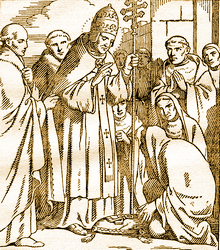Lives of the Saints
Our Models and Protectors
Spiritual Bouquet:
December 19

Blessed Urban V
Pope
(† 1370)
Blessed Urban V, whose family name was William de Grimoard, was born in Mende, on a mountain of the Cevenne hills. He rapidly mastered the various disciplines of literature and the sciences. It was religious life which then appeared to him as the ideal which could best respond to the propensities of his mind and the needs of his heart. He went to knock at the door of the Benedictine Abbey of Saint Victor near Marseille, and there, in the peaceful shadows of the cloister, he advanced day by day in all the virtues. He was remarked in particular for his tender devotion to the Blessed Virgin.
Religious profession had augmented his ardor for learning, and his Superiors soon judged the humble monk capable of teaching. In effect, his illustrious voice brought honor to the professorial chairs confided to him in Montpellier, Paris, Avignon and Toulouse. A few years later, after serving for a short time as Abbot of Saint Germain d'Auxerre, he was sent to Italy by Pope Clement VI as his legate. This, unbeknown to himself, was to be a step toward the highest existing dignity. He was elected Pope in October of 1362 and took the name of Urban V, because all the popes who had borne that name had ennobled it by the sanctity of their lives.
It is he who added to the papal tiara a third crown, not out of pride, but to symbolize the triple royalty of the pope over the faithful, the bishops, and the Roman States. When he mounted the throne of Saint Peter at that time in Avignon, he envisioned three great projects — the return of the Papacy from Avignon to Rome, the reformation of morals, and the propagation of the Catholic faith in distant lands. His return to Rome, which had not seen a Pope for sixty years, was a triumph. Nonetheless, the morals of Rome had undergone a sad decline.
Urban lived as a Saint during the days of his great works, fasting like a monk and directing all glory to God. At his death, he asked that the people be allowed to circulate around his bed: The people must see, he said, how Popes die.
Vie des Saints pour tous les jours de l'année, by Abbé L. Jaud (Mame: Tours, 1950).